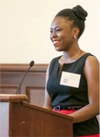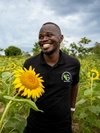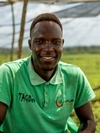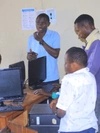Armanda Kouassi
Why Africa Needs Female Scientists

Rebecca, a recent graduate of The Mastercard Foundation Scholars Program at BRAC, in Uganda
"When I was at my school, the boys used to call us ‘half-men, because if you’re a lady and you go for sciences, you’re a half-man."
Like Rebecca, I am also a Mastercard Foundation Scholar and a girl who loves math and science. And, like many other girls, I wish I had more people who believed in me. I wish my professors in middle school had pushed me to pursue my studies in science, technology, engineering and mathematics (STEM). Instead I was encouraged to go into literature and languages, the most common path for girls. Fortunately, my grades in math and physics were so high that I was sent in the scientific track in high school.
I went on to study mechanical and industrial engineering, but my path did not get any easier. Being one of the few girls in engineering school – like in most STEM majors – can feel like a lonely fight. I had to prove that I was just as smart at the boys and that I had worked just as hard to get into engineering school. Some boys hinted that I didn’t belong in science, saying, “Actually, you’re here because they just want to increase the quota of girls.”
As a girl in science, you learn to overcome hostility from your male counterparts and to earn their respect. I wish I had more positive female role models in science who had overcome the same barriers in pursuing their passion and to whom I could relate. Although I was highly inspired by the successful stories of many women in STEM like Mae Jemison or Marie Curie, none of these women were African.
We African girls and women deserve to study science. Science needs us. Africa is at a crossroads in its development where it will need innovators, inventors, scientists and engineers to face challenges like climate change, food insecurity and the spread of disease, issues which so often have a greater impact on women. We cannot think about development, especially in today’s world, without considering how we can leverage science and technology for progress.
Women have a critical role to play in that process. We have a different way of looking at the world. We better understand the realities of women, like those who walk thousands of miles per day to get clean water for their household. With different ideas and perspectives come better solutions and thinking that can move scientific innovation forward and benefit the whole of Africa. Our contribution is needed.
These are some of the reasons why I founded Fillenscience, which translates to “Girls in Science”, a network that encourages girls to engage in STEM by providing them with positive role models and mentors. My hope is to inspire girls, not only to enter STEM fields, but to build careers in these fields and to use science and technology as a catalyst in the transformation of the continent.
I want to give girls like Rebecca what I wish I had for myself: positive role models in STEM who are women and who are African. I want to inspire and encourage girls to hold on to their ambitions, pursue their dreams and make a positive contribution to society.
Armanda Kouassi is a Mastercard Foundation Scholar. Armanda graduated with a master’s in industrial engineering and operations research from University of California, Berkeley in 2015 and is now an intern at IBM.





